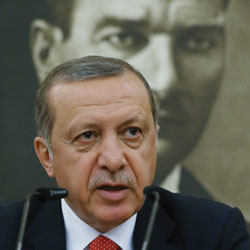
Terrorism, a military coup attempt, and a sovereign downgrade have failed to deter dedicated EM investment in Turkey, but deteriorating growth prospects and increasing nationalism may threaten its long term outlook, according to leading economists.
On Tuesday Turkey slashed its forecasts for GDP growth this year to 3.2% from an earlier forecast of 4.5%, putting it in line with the IMF’s real GDP projection of 3.3% for 2016 and 3% for 2017 that it issued this week.
While many expected revised growth numbers, investors are starting to question the effectiveness of government and central bank policy to stimulate growth. In addition, Turkey’s increasingly nationalist stance is threatening to undermine investor confidence.
“The impression I get from speaking to locals and the corporate community is that there is a significant fear factor,” said Viktor Szabo, a senior investment manager at Aberdeen Asset Management in London. “It’s not just the usual uncertainty but the ongoing purges, it is poisoning business relations. Turkey needs FDI but despite noise about ease of access to local markets, it is very difficult to do business there.”
Turkey’s relationship with trading partners, particularly Europe, is complicated. Relations on both sides cooled substantially in the wake of Turkey’s failed coup attempt on July 15. The European community was shocked by Turkey’s move to round up thousands of military personnel and by the associated talks to reintroduce the death penalty.
The EU issued a statement to say the measures taken were “unacceptable” and that they were “concerned” by Turkey’s decision to declare a state of emergency. This was recently extended by President Recep Tayyip Erdogan’s administration. Turkey was in turn dismayed by Europe’s response.
While both sides have proceeded with a relationship of mutual suspicion regarding the immigration deal, anti-terrorism laws and visa-free travel, the relationship could deteriorate further should Turkey reintroduce the death penalty, something which analysts say cannot be discounted.
In addition, now the likelihood of EU membership is waning, analysts are concerned that Erdogan’s increasingly errant and nationalistic polices may further impact the business environment, as well as relationships with European partners.
“The prospects for EU membership have long provided an important policy anchor,” said Markus Schneider, senior EM economist at Alliance Bernstein. “Yet with EU accession firmly on hold post-Brexit, this anchor is likely to weaken again and risks alienating Turkey from its European counterparts.”
While Turkey’s move to extend by 12 weeks the state of emergency declared post-coup has alarmed some, Schneider points out that Turkey has used its powers of decrees exclusively to counter the threat of domestic terrorism, and not for any other policy measures. “They have been relatively disciplined so far,” he said.
